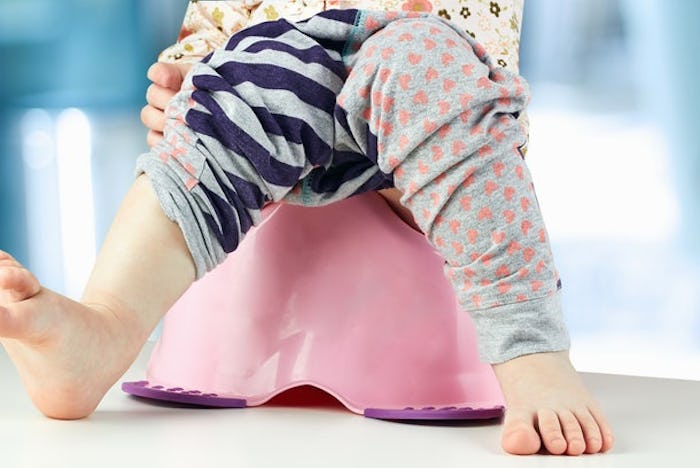Life

Here's What To Do If You've Missed Your Child's Potty Training Window
It's not uncommon to start obsessing over potty training the moment your kid becomes a toddler. The pressure (or desire) to ditch the diapers, and the excitement of hitting another milestone, can make even the most patient of parents restless. But if you weren't jumping at the bit, or took more of a "follow my kid's lead" approach, it might take a while for your kid to master the porcelain throne. But is it possible to miss the window for potty training? And if you are afraid you did, is there something you can do to help your kid transition from diapers to the "big kid" potty?
To find out more about the so-called "potty training window" and what to do if it has come and gone, Romper spoke with potty training experts Jamie Glowacki, author of Oh Crap! Potty Training, and Allison Jandu, founder of the website www.pottytrainingconsultant.com and author of potty training guides The Poop Puzzle and The Wee Hours. According to both Glowacki and Jandu, there is indeed a window of opportunity when most kids will have an easier time potty training... and it's earlier than you might think.
According to the American Academy of Pediatrics, your child will experience a number of emotional "prime times" and difficult periods that could make toilet training either a breeze or a virtual nightmare. The difficulty, of course, is recognizing when your child is emotionally ready or will have a harder go of it. The first step, according to the AAP, is to observe your child's general behavior and responses to your potty training suggestions or nudges.
But there is a potty training sweet spot, according to Glowacki: somewhere between 20 and 30 months. After that window things get much harder. "After 30 months, somewhere around the age of 3, individuation hits," she says. "This is the physiological process in which your child learns they are their own person, separate from you. It is the age of 'threenager,' realizing free will and choice and 'no.'"
According to Jandu, this "sweet spot" means, generally speaking, that the average child is "physiologically and emotionally capable" of handling potty training when they fall within this age range. "Also, they are more eager to please, less resistant to change, and wanting to mimic the adults around them which makes the process much easier," she adds.
Potty training is just another milestone. Some kids struggle. Some kids don’t. It’s just another thing, so don’t make it bigger than it is.
It's natural the wonder what to do if you've missed the window, especially if your child is not getting the hang of things or just seems resistant to potty training in general. Jandu and Glowacki agree that while potty training may be easier with a younger child, you aren't doomed if you start the process a little later later. "You have to recognize that you’ll be dealing with more behavior than learning," Glowacki says. "If you already have a super strong-willed little one, that will be exacerbated in potty training past age 3."
She stresses that parents should view potty training as helping your child learn new habits, adding, "Diaper use is just a habit. Potty training is creating a new habit. While you’re not doomed if you wait till 3 or even 4, you have to realize that you’ve doubled down on the length of that habit, which makes it harder to break."
Jandu adds that missing the window might make potty training harder for you, too. "Waiting too long can also back you into a corner, forcing you to potty train under a deadline, like needing to be potty trained in order to start preschool for example," she says. "And stress plus potty training is never a good mix."
Jandu notes that your child is an individual and if they have developmental delays or something happens to delay or interfere with training, you may end up training later and that's OK. "There is no one-size-fits-all way to potty train, and no right or wrong method," she says. "The best thing to do is educate yourself, get on the same page with daycare/other caregivers, and keep things as consistent for your child as possible once you start."
Glowacki stresses the importance of believing in your child and yourself throughout this process, and trusting that, yes, you can potty train your child. "The biggest precursor of success is parents staying calm, cool, and collected," she tells Romper. "Potty training is just another milestone. Some kids struggle. Some kids don’t. It’s just another thing, so don’t make it bigger than it is."
"It is NOT a measurement of your parenting," she adds.
Above all else, Jandu says you shouldn't be hard on yourself as you try to train your child, especially if they missed the so-called window. "Never, ever compare your potty training journey to someone else's," she says, which might actually be the best parenting advice of all.